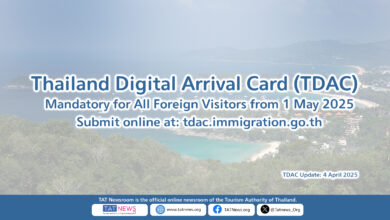Bangkok, 29 September, 2021 – The Thai Cabinet has approved a one-year extension of the ‘special tourist visa’ (STV) scheme for long-staying visitors until 30 September, 2022. The programme has been in effect from 30 September, last year, and was originally due to end tomorrow.
The Cabinet’s approval of the STV scheme as proposed by the Ministry of Tourism and Sports entailed special permission for long-stay visitors to Thailand of all types – from tourists to business travellers, investors and others – and tourists and crews of foreign cruises and yachts.
In the official statement released yesterday (28 September, 2021), Deputy Government Spokesperson, Ms. Traisuree Taisaranakul, said the extension of the STV scheme is aimed to encourage foreign families with high-purchasing power to visit Thailand for a long-term stay of between 90-270 days.
According to the Ministry of Tourism and Sports, over the first year, Thailand welcomed a total of 5,609 long-staying visitors under the STV scheme generating at least 1,243 million Baht in revenue. Top source markets have included China, Croatia, Denmark, Hong Kong, the Netherlands, Singapore, and Spain.
These long-staying visitors stayed an average of 90 days with their top destinations in Thailand being Bangkok, Chiang Mai, Chon Buri (Pattaya), Nonthaburi, Pathum Thani, Rayong, Surat Thani (Ko Samui), and Udon Thani.
The STV scheme’s pivotal role in helping revive the country’s economy and support for tourism and hospitality businesses and supply chain operators has resulted in the Tourism Authority of Thailand’s (TAT) winning of the Gold Award in the Marketing Campaign (National – Asia) category of the 2021 PATA Gold Awards organised by the Pacific Asia Travel Association (PATA).
Launched in October 2020, by the Ministry of Tourism and Sports and TAT, the STV scheme is a premium long-stay 90-day visa, which could be extended twice for up to 90 days each time. It was created in response to the growing demand seen from long-stay foreign tourists from potential markets during the COVID-19 pandemic, while addressing the necessary safety and health measures in place like the Alternative State Quarantine or Alternative Local Quarantine requirement.






